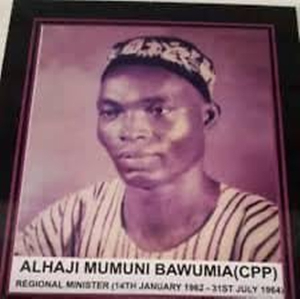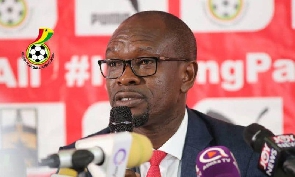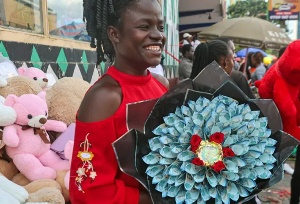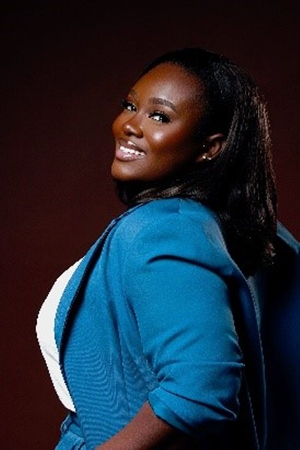RECOUNTING MY OWN EXPERIENCES TO PAINT A GROTESQUE PICTURE
BY OTCHERE DARKO
The purpose of this write-up is to draw the attention of Ghanaians to some major drawbacks within the ideas, thinking, motivation and configuration of parties in Ghana that seem to account for the failures of our current two dominant parties, in particular, and in the entire party system in Ghana, in general. This write up is based on actualities, and not on academic or research work. It is fished out of pieces of personal encounters. For obvious reasons, names of parties, of people and of places have been left out wilfully. Nonetheless, the write up attempts to bring out the weaknesses in Ghana’s political party system that need to be addressed, if Ghana and Ghanaians are to derive positive results from our current democratic dispensation. The piece does not seek to endorse any particular political ideology or philosophy. It merely says what is wrong with Ghanaians when it comes to joining and participating in parties, and no particular party is mentioned or implicitly targeted for exposure.
ONE COMMON CHARACTERISTIC OF THE GHANAIAN PARTY SYSTEM IS THAT WHEN IT COMES TO JOINING OR SUPPORTING PARTIES, GHANAIANS THINK ABOUT WHAT THEY, AS INDIVIDUALS, HOPE TO GET FROM THE PARTY AND NOT ABOUT WHAT THEY WANT TO DO FOR THE PARTY OR THE COUNTRY.
I have personally, in the past [but not now], been associated with a defunct political party and did occupy one of the top local party executive positions before one of the coups in the country and the political persecutions, hypocrisies and sycophancies that followed from it forced me to quit politics, [forever or for a time being, at least]. My experiences then, combined with what I see to be happening now, fully back the assertion above that Ghanaians join and support parties because of what they hope to get from the parties at the time they join them, or from the nation, if their parties gain power in some future, but not because of what they want to do for the parties or for their country. When people hold this kind of motivation, they naturally become susceptible to bribery and corruption to achieve their personal agenda.
As a concrete proof of this assertion, I recount here an experience I had in one of our recent “post-coups” Ghanaian elections. I had decided to throw my weight behind what I saw as the least of the “two evil-parties” in the constituency where I live now in order to stop the worse of the “two evil-parties” from taking over our newly created constituency. Of course, I was acting on the weight of pleas from a friend who was a member of this least of the “two evil-parties”. Using my own money, vehicle and public address system, I mounted an intensive one-man campaign that helped immensely to record victory in my constituency for the candidate of the least of the “two evil-parties”. Then, after that, half of the youth and adults in that party that I campaigned for came to my house at different times to ask for all forms of financial consideration, simply because the party I campaigned for had won the elections and so I needed to do something for them, despite the fact that I had nothing to gain personally from what I did which I fully financed from my own pocket and not from their party’s coffers and, also, despite the fact that I did not personally have any form of relationship or acquaintance with the MP who won before I decided to throw my weight behind him. More specifically, two members of that party asked me after the elections to use my name to secure contracts for them in the constituency, because they believed that what I did entitled me to bid for contracts from the party at the constituency level. When I said I hated doing such a thing and would not do it, the two got angry with me, as if they believed that I was one of the “big men” in their party and, accordingly, they swore never to vote for the said [unnamed] party in the said [unnamed] constituency again. *Readers, just look at this kind of selfishness that takes place at the very grass-root of the party system! And yet we complain when the politicians steal or sell of the nation to outsiders for personal considerations. My experience recounted here should certainly remind readers about several other replications of this behaviour in recent youth actions of some parties in many parts of the country.
A SECOND CHARACTERISTIC OF THE GHANAIAN PARTY SYSTEM IS THAT THE PARTIES THEMSELVES, OUT OF NAIVETY OR OUT OF PURPOSEFUL MACHINATION, ENCOURAGE DONORS WHO DONATE TO THEIR COFFERS TO STATE WHAT THEY WANT FROM THE PARTIES’ GOVERNMENT IF THEY WIN ELECTIONS IN THE FUTURE.
This is as if to say people must demand something in return for the donations they make towards party’s finances. I am telling readers this statement as a fact which I am immediately going to support with circumstantial evidence. In one of the recent elections in “post-coups” Ghana, I decided to go the “constituency of my birth”, [as opposed to the constituency where I currently live], to see the political climate and development there. I visited a man with whom I was actively doing politics in the past in “the constituency of my birth” before “the dark days of Ghana’s democracy” commenced. I decided to donate a small amount of money to their party as an unsolicited gesture of goodwill. *Two things happened that shocked me profoundly. This one-time party associate of mine, and now one of the “gurus” at constituency, regional and national levels of one of the current parties in Ghana, first asked me what I wanted from their party in return for my donation, if they won an election that was then impending. I answered that I wanted nothing. He replied that it was unusual now for a person to make unsolicited donation without demanding anything in return. The second “shocker” was that his party did not accept donations in cheques. He said he had been directed by the party’s constituency leader that donations had to be “in cash” and not “in cheques”. The possibility of cheques bouncing was not on a reason he gave. I leave readers to make their own guess and draw their own conclusion from this second “shocker” and tally it with their conclusion from the first “shocker” narrated in this paragraph.
A THIRD CHARACTERISTIC OF THE PARTY SYSTEM IN GHANA IS THAT GHANAIAN PARTIES LACK THE MECHANISMS BY WHICH THEY CAN INSTIL DISCIPLINE AMONG THEIR MEMBERS WHO WIN ELECTIONS AND BECOME PRESIDENT, VICE PRESIDENT, MINISTERS, MP’s AND OTHER POLITICAL PUBLIC OFFICE HOLDERS.
After a party in Ghana has become victorious in general elections, the party itself then becomes subordinate to the elected members and their appointees. There appears to be no effective mechanism that compels the President and members of his Executive or Members of Parliament to tow the party line, or stick to the party’s policies and election manifesto or be instructed by the party’s Chairman or Executive. This means that, after a party has won elections in Ghana and assumed the reins of political leadership in the country, the party’s relationship with its elected members’ reverses from one of “master and servant relationship” to one of “the old servants”, [formerly the elected members], becoming “the new masters” and its corollary of “the old masters”, [formerly the party executives], sinking to the position of “the new servants”. This “upside-down” and “downside-up” situation of post-election partisan development in Ghana is one main reason why after elections elected members soon become distant, arrogant, selfish and act pursuant to their personal interests mainly, rather than pursuing the party’s policies and agenda. In most other political party systems, whether one is looking at China or at America, the party, after a general election, continues to remain on top of its members, ordinary, or elected, or members subsequently appointed to public offices and continues to guide and control their actions to ensure that they stay in tune with the party’s policies and agenda. Here in Ghana, after being elected into office, the President and his Ministers do what they like, with their party virtually doing nothing to bring them into line or get them to heed public concerns. For the party system of democracy to work and ensure efficiency and moral probity however, parties must be on top of elected members and have in place, within them, mechanisms that allow the parties to constantly guide, control and discipline elected members, instead of waiting for the end of the terms of office of such public officials before the electorate decide their fates and those of the parties. Democracy, whether it is based on a one-party system or on a multi-party system, revolves around effective party mechanism. Accordingly, if the “party mechanism” of a governing party fails to exercise effective control over members of the Nation’s Executive and the Legislature who are elected on the party’s ticket, then that party has failed in its supportive role towards the Nation’s democratic dispensation. After all, it is parties that voters first consider when they are casting their votes, before they give consideration to candidates and their personality variables that come into play in voters’ range of preferences.
CONCLUSION:
If Ghanaians and the Nation want to achieve the best from our multi-party democracy, then party members, from the grass-root level that forms the starting point in the stepladder of political corruption, have to be targeted, “monetarily” disciplined and modelled to play more politically constructive and facilitating roles that turn them away from politically degrading “money-harvesting” activities and gear them towards the pursuit of progressive party and national endeavours. This, among others, means party members, especially those at the grass-roots, have to be stopped from making personal demands on their parties and on politicians and should, instead, be guided to find ways to make their individual personal positive contributions towards both their party and the nation, bearing in mind that the more they “screw” their politicians, the more they encourage them, the politicians, to steal from the State to recoup such “losses” to them from grass-root “screwing”. Similarly, political parties should not allow themselves to be turned into “gold mines”; nor should they allow party and national election-times to become “harvesting seasons” for voters in their parties and elsewhere. Parties need to set the tone of, and obligation towards, acceptable party and national moral standards by installing and insisting on moral codes within their establishments. Again, parties, through their executives, must always place themselves above all party members including those elected to positions of State power, such as the President, his Vice and other members of the Executive, as well as those of the Legislature; and should not allow such members to be above party-disciplinary machineries.
CERTAINLY, GHANAIANS NEED A NEW POLITICAL AND PARTISAN MENTALITY THAT CORRELATES OUR NATIONAL DEMOCRACY AND VALUES AND PAVES THE WAY FOR GHANAIANS, IRRESPECTIVE OF THEIR PARTY IDEOLOGY, TO PUT NATIONAL INTERESTS FIRST IN ALL THINGS THEY DO TO ENSURE THAT THIS COUNTRY CAN TAKE ITS RIGHTFUL PLACE AMONG THE FAMILY OF TOMORROW’S SUCCESSFUL NATIONS OF THE WORLD.
SOURCE: OTCHERE DARKO.
[Posted on 7th August 2010]
Opinions of Sunday, 8 August 2010
Columnist: Otchere Darko














